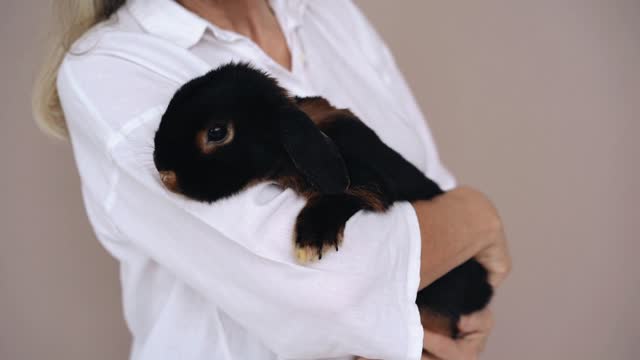Premium Only Content

HOW TO TELL IF YOUR RABBIT IS SAD AND DEPRESSED
Rabbits are becoming an increasingly popular family pet – and with good reason. They can be affectionate and attention-seeking, and quickly ingratiate themselves into your home life. Happy bunnies will hop, dance and binky their way into your hearts.
But while bunnies can be quite independent, they do need a close eye. Rabbit owners must get to know what’s ‘normal’ for their individual rabbits and pay attention to even the slightest change in behaviour. Any nuance could indicate an issue that needs to be fixed. This is particularly important because, as a prey species, rabbits tend to hide signs of illness. This means that any sign of illness is usually significant.
Is there such a thing as a ‘low mood’ in rabbits?
While rabbits don’t get psychological depression in the same way as humans, their behaviour can become subdued when they are ill or kept under stressful conditions.
A change in your rabbit’s behaviour can indicate many things:
They’re lonely
They’re in pain or sick
They don’t get enough exercise
They’re not eating the right things
Their living conditions aren’t great
They are grieving the loss of a companion
The signs of an unhappy rabbit
Bunny owners get very used to the ‘thump’ that can indicate a grumpy creature, but if rabbits are acting lethargic, reluctant to move and hiding away all day, then it can be cause for concern.
Be especially mindful of any of the following behaviours:
Chewing cage bars, if they’re kept in a hutch
Pulling at their fur and over-grooming - or not grooming at all
A change in feeding or toilet habits
Drinking a lot more
Repeated circling or pacing up and down
Biting and destructive behaviours
A lack of energy and curiosity
Your rabbit’s ears can be a good indicator, too. An unhappy rabbit will usually lay its ears back; the further back the ears fall, the more unhappy they are.
How to keep happy rabbits
Happy rabbits have a lot of energy. They enjoy running around and playing. They’re also very social creatures, so spending time with their family members – human and rabbit – is essential to their happiness. If you’re in doubt about their behaviour, it’s always best to discuss it with your vet or a rabbit expert.
Make sure they have a companion
Companionship is key to rabbit happiness. If your rabbit is living alone, they could be lonely and bored. If you keep rabbits in a pair at least, then they will be able to entertain each other and not require as much attention from their human companions.
Make sure they’re eating well
Rabbit digestive systems are complex and delicately balanced, so a poor diet can impact their gut. This, in turn, can make them feel sick and act subdued. Ensure your rabbits have plenty of good quality hay to munch on all day, and a steady supply of leafy greens and other appropriate fresh food.
Make sure they have the right housing
If your rabbits are kept outdoors in a hutch, they need the space to be able to hop, stretch out fully and stand up on their hind legs. But a hutch alone is not enough. You need to ensure your rabbit gets time to run around and play, so invest in some temporary fencing or a run so they have enough room to lay stretched out and move around in the great outdoors.
Make sure they get mental and physical stimulation
Linked to all of the above is the need for stimulation. Being social creatures that love to play, rabbits benefit from a rotating collection of toys. They are also incredibly curious little things, so give them puzzles and things to investigate to help stave off boredom.
If in doubt, talk to your vet
Rabbits depend on us humans for a lot of their wellbeing. If you’ve tried these tips and bunny still isn’t improving, have a chat with your vet.
-
 1:10:08
1:10:08
Donald Trump Jr.
10 hours agoWhat Real Leadership Looks Like, Live with Sen Bernie Moreno | TRIGGERED Ep.210
157K235 -
 1:38:57
1:38:57
Glenn Greenwald
9 hours agoWith Tulsi's Hearing this Week, Establishment Attacks her with Lies About Snowden & 702; U.S. Journalist Arrested in Switzerland for Criticizing Israel; China's Leap Forward in AI | SYSTEM UPDATE #397
82.3K91 -
 57:43
57:43
The StoneZONE with Roger Stone
6 hours agoWhat Will The JFK Assassination Files Reveal? | The StoneZONE w/ Roger Stone
36.5K8 -
 18:24
18:24
Tundra Tactical
8 hours ago $6.70 earnedWhats New With HRT Tactical Gear at SHOT Show 2025
53.8K7 -
 23:27
23:27
Rethinking the Dollar
8 hours agoWealth Protection SECRETS Learned from Wildfires w/ Paul Stone
91.9K14 -
 59:28
59:28
Flyover Conservatives
1 day agoInsider Reacts to Trump’s 100 Hours: Davos, WHO, Climate Change, DEI… - Alex Newman | FOC Show
51.1K6 -
 1:04:30
1:04:30
Battleground with Sean Parnell
12 hours agoPresident Trump Is Flooding The Zone
133K14 -
 2:12:53
2:12:53
We Like Shooting
18 hours ago $0.92 earnedWe Like Shooting 595 (Gun Podcast)
21.5K -
 2:00:28
2:00:28
megimu32
7 hours agoON THE SUBJECT: 90s Toys, Fat Phobia, and Crying Libs!
28.5K3 -
 LIVE
LIVE
Right Side Broadcasting Network
15 hours agoLIVE REPLAY: President Trump Addresses House GOP in Doral, FL - 1/27/25
2,965 watching